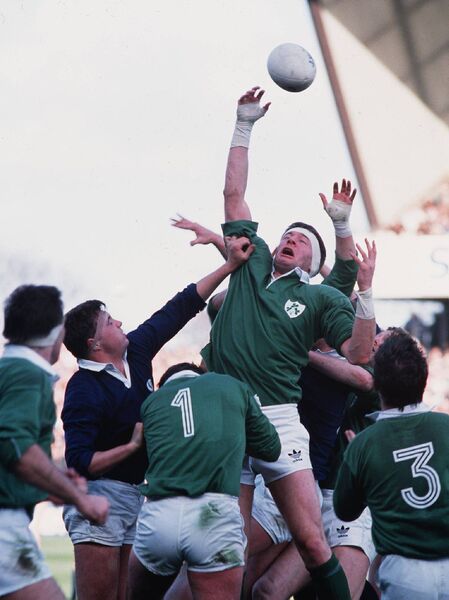Can ghosts of the past scare the Scots into life?

Scotland’s Duhan van der Merwe and Pierre Schoeman dejected after last year's Six Nations loss to Ireland at Murrayfield. Picture: INPHO/James Crombie
By the time Scotland step out to face Wales in their 2024 Six Nations opener, 12,740 days will have elapsed since they last claimed the championship. For a country with a rugby tradition as rich as Scotland's, that should be utterly unacceptable. Few Scots would argue against that point – this is the country that played in the first-ever international game of rugby union. Players like Chris Patterson, Stuart Hogg, current head coach Gregor Townsend and many more have gone through their careers without any success with their country. That would have been unfathomable for the side that won the Five Nations in 1999 But Scottish shortcomings have come to be expected over the last two decades. More often than not, they have been left battling with Italy to avoid the ignominy of being awarded the Wooden Spoon by the end of the spring. Recent years have, however, seen a Scottish resurgence of sorts, even if the quest to land silverware has fallen short thus far. The nation finished third in last year's championship and had been consistently finishing ahead of Wales and Italy previously. And while they haven't blown the world away, it's clear that the side have the makings of a golden generation in the right conditions.

Still, that Scotland have been improving on the international stage in recent seasons has only served to paper over the cracks. As well as failing to win any silverware at international level since 1989, the club cabinet is also relatively bare.
Since Glasgow Warriors' domestic title back in 2014, Scottish clubs have failed to win any silverware. In the women's game, Scotland have been the recipients of the majority of Wooden Spoons in the Six Nations over the past decade. More troubling for the country is the distinct lack of talent coming up through the underage ranks. The Scotland under-20 side has only won a single Six Nations game across the last three seasons. But a one-point win over Wales in last year's championship at Scotstoun Stadium was quickly forgotten as they slumped to heavy defeats which included a 75-point loss to Ireland.
Adding to their Six Nations woes is their recent record at the World Rugby U20 Championship.
The side was relegated from the 2019 competition, the last before the pandemic. After losing to both Italy and Fiji in the play-offs in that year's competition, the nation was forced to compete in the World Rugby U20 Trophy, a tournament for second tier nations. The competition returned last year, following a hiatus brought about by the pandemic, with eight teams travelling to Kenya to compete. But despite the level of the competition, a loss to Uruguay meant Scotland ultimately only finished third in the tournament.
Although Spain went on to win the tournament and qualify for this year's tier one competition, Scotland hold their place in the under-20 Six Nations. They have that comfort blanket for now, but it's a slippery slope to the depths beyond mediocrity. And these results suggest that very lean times may be set to return to the senior game sooner rather than later.
For that very reason, Townsend's side need to make a major statement in this year's championship. More than any other side. The championship therefore brings immense pressure, but it also represents a great opportunity for the side that should have sufficient talent and experience to challenge for a title.

For a start, Ireland and France could still be shaking off the hangover following last year's World Cup disappointments. Andy Farrell's side went into last year's tournament as favourites and still exited at the quarter-final stage while France’s hopes of claiming the Webb Ellis trophy for the first time on home soil were dashed by South Africa at the same stage in one of the most entertaining games in World Cup history.
Ireland will, of course, also be a little rusty as they enter a Six Nations campaign for the first time in 15 years without Johnny Sexton while France's talisman, Antoine Dupont, has decided to focus on sevens rugby over the coming months as the country attempts to claim gold in next year's Olympic Games in Paris. Fabien Galthié's side will also be without Romain Ntamack who is still recovering from a cruciate injury.
Regardless of those absentees, it will be difficult for both countries not to be somewhat focused on developing for the future as they begin yet another World Cup cycle. And neither side can possibly have the same ravenous hunger as a Scottish side who haven't lifted the trophy since 1989.
As for England and Wales, both countries are heading into this year's championship from a lower base with much work to do if they're to reach previous standards. Both sides are capable of producing a big result on any given day, with England's tussle with South Africa in last year's Rugby World Cup semi-final being a case in point. But neither side is likely to produce the consistency required to claim the championship. Italy will meanwhile head into the tournament as they always have – striving to avoid the Wooden Spoon and thus maintaining the argument for their inclusion in the tournament.
And fixtures may have landed just right for Scotland, too. They will be playing France at Murrayfield and they don't have to come to Dublin to play Ireland until the final week of the tournament, giving them a chance to build momentum. That is, of course, only one way of looking at it. The championship may also be on the line for Ireland when Scotland cross the Irish Sea on St Patrick's Weekend.
Either way, Scotland shouldn't be lacking for desire and motivation if that scenario arises. While Irish players have the experience of lifting the trophy on home soil last year, Scotland have the ghosts of previous generations that left the international arena without success – they just need to find a way of emotionally harnessing that energy in a way that isn't detrimental to their game.
There are many definitions of Hell, each one as terrifying as the next. But perhaps the most chilling of them all is the image of having to spend your last day on Earth meeting the person you could've been. Scotland may see the fires burning in the distance – but they haven't run out of time just yet.





